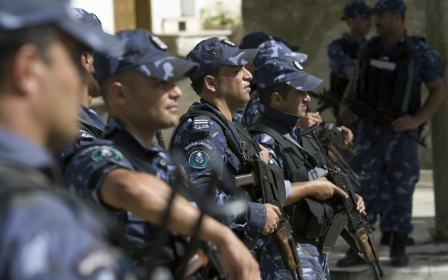Israel's Netanyahu appears in court as corruption trial begins
Israeli Prime Minister Benjamin Netanyahu appeared in court on Sunday to face trial over a string of corruption charges, the first sitting premier to do so in the country's history.
Netanyahu, who has just successfully formed a government after 500 days of electoral deadlock, denies the charges against him, which include illegally trading favours in exchange for positive media coverage and accepting gifts worth 700,000 shekels ($198,224) from wealthy personalities in exchange for benefits.
In a statement to the media outside the courtroom, Netanyahu said he began his trial with his "head held high".
"The objective is to topple a strong prime minister from the rightist camp and thus to remove the right-wing from leadership for many years," he said to television cameras.
Israel's longest-serving leader was flanked by senior aides and officials, who wore face masks to protect against coronavirus, and was met by crowds of protesters.
New MEE newsletter: Jerusalem Dispatch
Sign up to get the latest insights and analysis on Israel-Palestine, alongside Turkey Unpacked and other MEE newsletters
In the courtroom, one of the judges asked Netanyahu whether he had read and understood the indictment.
The prime minister then stood up and replied: "Yes, your Honour."
In January, following months of speculation and police questioning, Attorney General Avichai Mandelblit in January filed charges against Netanyahu.
The apparently severe setback for Netanyahu comes despite consolidation of power both at the top of the Likud party and at the top of government, after hammering out a power-sharing deal with his chief election rival Benny Gantz.
The agreement is set to see Netanyahu continuing to lead the government for 18 months before handing over the premiership to Gantz.
A sitting prime minister does not have automatic immunity from prosecution under Israeli law, but is also under no obligation to resign when charged, only when convicted and after all appeals are rejected.
Netanyahu's trial had been set to open in mid-March, but was postponed as a result of the coronavirus Covid-19 pandemic to 24 May.
His lawyers had requested that he be excused from appearing in person at the opening of the trial on technical grounds, but the court rejected the request, citing a clause in Israeli criminal law stating that "a person may not be tried on criminal charges except in his presence".
Political 'death warrant'
Among the most serious allegations against Netanyahu is the claim that he offered media mogul Shaul Elovitch regulatory changes worth millions of dollars to his telecom giant Bezeq in exchange for favourable reporting on the Walla! news website.
That charge is also the most complex, said Amir Fuchs, a researcher at the Israel Democracy Institute, who argued it differs from "classic" bribery cases where money changes hands.
Netanyahu's corruption cases
+ Show - HideIsraeli Prime Minister Benjamin Netanyahu is facing potential charges in three cases focused on corruption, known by their codes 4000, 1000 and 2000.
Case 4000: Netanyahu accused of granted regulatory favours to Israel's leading telecommunications company, Bezeq Telecom Israel, in return for positive coverage of him and his wife Sara on a news website controlled by the company's former chairman.
Case 1000: Netanyahu and his wife allegedly wrongfully received gifts from Israeli filmmaker Arnon Milchan and Australian billionaire businessman James Packer, including champagne and cigars.
Case 2000: Netanyahu suspected of negotiating a deal with the owner of Israel's best-selling daily newspaper, Yedioth Ahronoth, for better coverage in return for legislation that would slow the growth of a rival daily newspaper.
In this case, Fuchs said, the allegation is that Netanyahu "is getting only media coverage," rather than cash.
"It is unprecedented," he told reporters.
But in the Bezeq case, Fuchs added, Netanyahu is accused of doing far more than seeking flattering write-ups.
"It was actually complete editorial control of this site even on the specifics of which posts to make, or which pictures."
Yuval Shany, law professor at the Hebrew University of Jerusalem, argued that there is "a basic incompatibility" between Netanyahu's role as head of the government and his status as a criminal defendant.
In the latter role, Shany said, the premier will be "fighting very aggressively and maybe effectively to weaken the government authorities that are prosecuting him".
"There is a very serious conflict of interest situation," he said.
Once the trial is under way, the three judges selected by the Supreme Court will be able to demand Netanyahu's presence in court when they consider it necessary.
At any time before the verdict Israeli law allows Netanyahu to change his plea in exchange for lesser or fewer charges.
Such plea bargains are common in Israeli courts.
Middle East Eye delivers independent and unrivalled coverage and analysis of the Middle East, North Africa and beyond. To learn more about republishing this content and the associated fees, please fill out this form. More about MEE can be found here.






